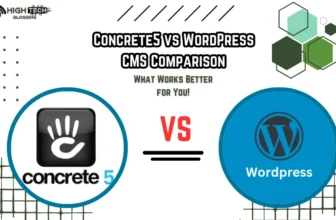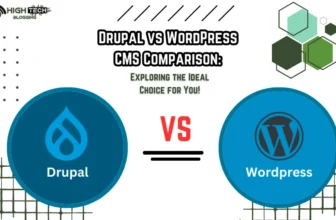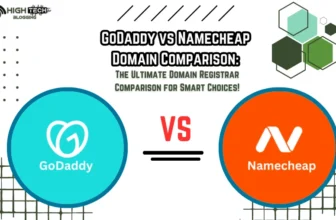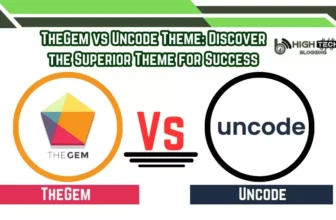Don’t be fooled into thinking that all domain registrars are the same: They are not. Features and functionality vary widely, and many companies that brag about low domain registration fees may end up costing you more due to hidden fees.
In this article, I will compare two of the most popular domain registrars: GoDaddy Vs Namecheap. Both companies have been selling domains for more than 20 years and have expanded their offerings to provide customers with website hosting, business email, applications and more.
I’ll be taking a close look at the usability of both companies and what domain extensions are available. I’ll also review important features like domain privacy, domain registration costs, support options and more to help you make an informed decision about which service is best for anyone looking to register a new website domain name.
Table of Contents
Let’s dive in…
GoDaddy and Namecheap – Key Points
GoDaddy
Namecheap
First, let’s take a look at how these companies got started.
GoDaddy Vs Namecheap: Quick Comparison
GoDaddy was founded in 1997 under the name “Jomax Technologies” and was renamed GoDaddy only two years later. When the domain industry opened up in 1998, the company grew rapidly due to its aggressive marketing techniques and low prices, and by 2005 was the largest domain registrar in the world.

Namecheap was founded in 2000 by Richard Kirkendall and launched a year later. Although not as big as GoDaddy, Namecheap is one of the most popular domain registration services with more than 10 million domains under management.

While it is common today for domain registration companies to offer additional website-related products and services to their customers, GoDaddy and Namecheap were among the first to do so, and it remains an important part of their business structure.
User-Interface & Ease of Use
GoDaddy has gone through many redesigns and changes over the past two decades. For a long time I found GoDaddy frustrating to use, but I’m a big fan of the current concept, as there are fewer promotions and the company has introduced a nice, minimalist user interface.
All products are listed in your GoDaddy dashboard, while domains can be viewed and managed through a dedicated domain manager. From there, you can control everything, including your DNS settings, domain transfers, and domain registration details.
Managing multiple domains is also easy with GoDaddy, since you can put them in folders and make changes in bulk with just a few clicks.

Namecheap’s user interface is more colorful than GoDaddy’s, but just as easy to navigate. Namecheap’s main navigation menu lets you view your main dashboard, expiring and expired domains, your domain list, products, apps, and profile.
You can make changes to multiple domains by selecting the domains and then selecting the desired action at the top of the domain list.

In terms of usability, there is little difference between GoDaddy and Namecheap. There are plenty of options with both services, and the account area is easy to navigate.
Winner: Tie
Domain Extensions Availability
A wide selection of domain name extensions can simplify the search for the right domain for your project.
GoDaddy currently offers 499 domain extensions, but another 265 are in the pipeline. There are domain extensions for localized websites, commerce, sports, technology and more.

Namecheap offers 480 domain extensions. While GoDaddy helps you filter domain searches by extension category, Namecheap goes a step further and offers additional filters for price, omitting final vowels, and applying domain hacks (e.g. hireme.com → hire.me).

You will have no problems finding a suitable domain name at GoDaddy or Namecheap, as both offer a wide range of domain name extensions.
Winner: Tie
Email Forwarding
With email forwarding, you can create personalized emails for your domain name and then forward them to an email address of your choice. For example, I could create kevin@wpmarmalade.com and forward it to my personal gmail account.
GoDaddy charges an additional $3 per year fee for this service for five individual email addresses that are forwarded. In contrast, Namecheap offers email forwarding for free to all customers and allows forwarding of up to one hundred custom email addresses.

Both GoDaddy and Namecheap allow you to set up forwarding email addresses, but GoDaddy requires you to pay for the privilege.
Winner: Namecheap
Domain Privacy
The WHOIS database for domains contains information about who owns each registered domain name. Therefore, when you register a domain name, you must also provide sensitive information such as your name, address, email address, and phone number.
Unfortunately, this information is publicly available online by default.
At GoDaddy, you can hide this information from others for $9.99 per year per domain. For an additional $5 per year per domain, you can add domain blacklist monitoring and malware scanning.

Namecheap’s privacy protection feature is called WhoisGuard Privacy Protection and is 100% free. For each domain you own, Namecheap will use a unique xyz.protect@whoisguard.com address for your domain in the WHOIS database.

Privacy is something that everyone should prioritize, which makes Namecheap the clear winner in this category.
Winner: Namecheap
Domain Transfers
Domain names can be transferred between domain registrars at any time. The only restriction is that a domain cannot be transferred if it has been registered or renewed within the last 60 days.
To transfer a domain to GoDaddy, all you need to do is unlock the domain with your old registrar and then start the domain transfer process using the authorization code provided by your old registrar. To transfer a domain, simply select to transfer your domain away on the additional settings page in the domain management area.

The domain transfer process is exactly the same with Namecheap. Simply enter your domain name and provide the transfer authorization code you received from your old registrar. To transfer a domain, go to the domain list page and select “Sharing & Transfer”. There you will find an option to unlock each of your domains and generate a transfer authorization code.

When you transfer a domain name to a new registrar, you must pay for an additional year of registration. Both GoDaddy and Namecheap offer a reduced registration fee to encourage customers to transfer their domains to them.
Winner: Tie
Domain Pricing
Although you should not choose a domain registrar solely on the basis of costs, they obviously play a role in the company you ultimately choose.
Since domain registrars have different pricing policies, you need to look at all potential costs to make a direct comparison, as companies often charge different rates for transferring a domain name, registering a new domain name, and renewing a domain name. At GoDaddy, for example, transferring a .com domain name costs $8.99, registering a new .com domain costs $12.99 and renewing costs $17.99. Many other domain extensions are heavily discounted, costing only $1 or $2 for the first year of registration.
As mentioned earlier, GoDaddy charges an additional fee for features such as WHOIS privacy and email forwarding. Because of this, the annual cost for a .com domain with these features is $30.98 starting from the second year with GoDaddy.

Namecheap’s prices are cheaper across the board. For example, for a .com domain name, domain transfer costs $8.58, new registration costs $8.88, and renewal costs $12.98.
These registration costs also include additional features such as WHOIS privacy and email forwarding.

GoDaddy’s special first-year registration offers may dominate the headlines, but for most domain name extensions, Namecheap is significantly cheaper than GoDaddy.
Winner: Namecheap
Additional Services
GoDaddy and Namecheap are no longer just domain registrars, but both companies sell many additional products and services.
To make it easier for customers to create websites, GoDaddy offers a user-friendly website builder for creating traditional websites and online stores with a wide range of website designs. Shared hosting, VPS hosting, WordPress hosting and dedicated servers are also offered. Hosting prices start at $4.99 per month for an entry-level VPS hosting plan with 20 GB of storage.
The company also offers many business-related services, such as professional email accounts, Microsoft Office 365 and a digital marketing suite. There’s even the option to add a second phone number to your smartphone.

You can also host your website at Namecheap. It offers shared hosting, VPS hosting, managed WordPress hosting, reseller hosting and dedicated servers. Prices are a bit more affordable, with the entry-level shared hosting plan starting at just $1.98 per month for 20 GB of storage.
Namecheap also offers professional email accounts for businesses, a content delivery network and premium DNS.

GoDaddy and Namecheap offer a similar range of tools, products and services to their customers. Namecheap hosting is slightly cheaper for most web hosting plans, but there is not much difference in pricing.
Winner: Tie
Quality of Support
If you are new to domain name registration and website creation, I strongly recommend that you prioritize the quality of support when choosing a domain registrar. Those of you who have been managing domains for many years should still consider support options.
Support is one area where GoDaddy excels, and its help center offers written guides, video tutorials, and a support forum. If you need direct help with your account, you can contact GoDaddy 24 hours a day via the chat box or by phone.

Like GoDaddy, Namecheap has an extensive documentation section with a knowledge base, guides and video tutorials, while support is offered 24/7 via live chat and a ticket support system.

The level of documentation and support from GoDaddy and Namecheap is impressive. Even if you don’t need phone support often, you can count on being able to call GoDaddy if you have a problem and talk to someone directly.
Winner: GoDaddy
Conclusion
It’s easy to see why GoDaddy and Namecheap are two of the most popular domain registrars. Both companies offer around 500 domain extensions and have modern, user-friendly domain managers that allow you to make big changes to your portfolio.
I’m a big fan of GoDaddy’s new, minimalist interface, and I like the fact that customers can call GoDaddy at any time of day to resolve an issue. However, I think Namecheap will be a better choice for many people because the cost of domain registration is significantly lower and includes premium features like WHOIS Privacy that GoDaddy charges for.
FAQs
What is the difference between GoDaddy and Namecheap?
GoDaddy and Namecheap are both popular domain registration and web hosting companies, but they have some key differences. GoDaddy is known for its extensive marketing efforts and user-friendly interface, while Namecheap focuses more on affordable pricing and strong customer support.
Which company offers better pricing for domain registration?
Namecheap is often considered to have better pricing for domain registration. They are known for offering competitive prices and occasional promotions, making it more affordable for individuals and small businesses to register and manage their domains.
Can I transfer my domain from GoDaddy to Namecheap?
Yes, you can transfer your domain from GoDaddy to Namecheap. Both companies support domain transfers, and the process typically involves obtaining an authorization code from GoDaddy and initiating the transfer through Namecheap’s domain management system.
Does GoDaddy or Namecheap offer better customer support?
Namecheap is generally praised for its customer support. They offer 24/7 live chat and ticket-based support, with responsive and knowledgeable representatives. GoDaddy’s customer support has received mixed reviews, with some customers reporting longer response times and less satisfactory experiences.
Which company has better website builder tools?
GoDaddy is known for its robust website builder tools. They provide an intuitive drag-and-drop editor and a wide range of pre-designed templates, making it easier for users without technical expertise to build and customize their websites. Namecheap also offers website builder options, but they are generally considered to be less feature-rich compared to GoDaddy.
To read more similar articles, click here.
Thanks for visiting our Website. If you appreciate our work, kindly show us some support in our comments section. 🙂
Norman Dwemer is a tech blogger who focuses on the future of technology. his blog delves into emerging technologies such as artificial intelligence, blockchain, and quantum computing, as well as their potential impact on our lives and society. Rachel’s writings provide a sneak peek into the future of tech, examining the possibilities and risks of these cutting-edge technologies. he also shares the most recent developments and research in these fields, delivering the latest news and insights to his readers. Norman’s visionary outlook on the world of tech has establihed his as an authoritative figure for anyone interested in the forefront of technology.







